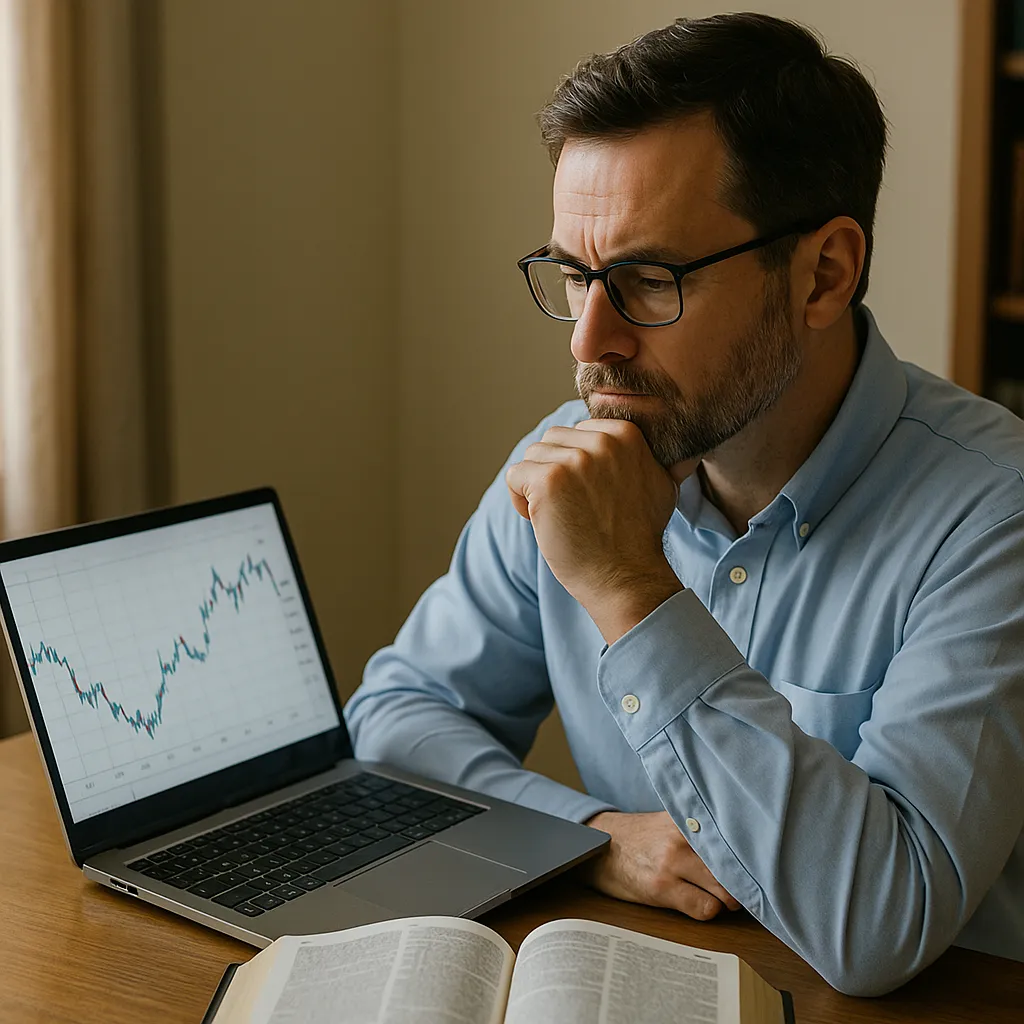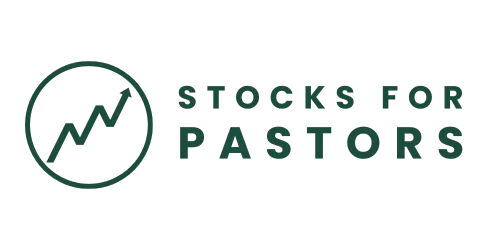
Why Most Pastors Think Investing Is Risky (And Why They’re Wrong)
Let me ask you a question. When you hear the word investing, what’s your gut reaction?
Be honest. Does it feel a little like gambling? Does it stir up that uneasy feeling, like it’s risky, unpredictable, or maybe even unwise?
You’re not alone. That’s what most pastors I talk to think at first. And for a long time, I thought the same thing.
I figured investing was what rich people did with their leftovers. I assumed you needed either a finance degree or a Vegas-level risk tolerance. And I definitely didn’t see it as something a pastor, someone who values stewardship and faithfulness, should be involved in.
But I was wrong.
And if you’ve ever had those same thoughts, I want to show you why that fear doesn’t have to be your reality.
We’ve Only Seen the Worst Examples
Let’s be honest. Most of what we see in the media about investing is hype. Everywhere you look, there are flashy headlines trying to grab your attention.
“Buy this stock before it triples!” “Crypto millionaire loses it all in 24 hours!” “10 hot stocks to bet the farm on!”
The stories we hear and the ones that get shared the most are dramatic and extreme. They often involve someone either making a ton of money overnight or losing it just as fast. And because those stories are louder than the quiet, steady ones, they shape our perception.
No wonder people think investing is dangerous. We’re surrounded by examples of people chasing fast money, playing high-stakes games, and blowing up their financial lives. It looks like a rollercoaster, and most of us want nothing to do with that kind of chaos.
But here’s the thing. That’s not investing. That’s speculation. There’s a big difference.
Speculation is based on hype, headlines, and hot tips. It’s reactive and emotional. True investing is thoughtful. It’s based on data and discipline. It has structure. And it gives you back something more valuable than money—peace of mind.
What I teach is boring. On purpose. It’s a steady, repeatable process that focuses on patterns, not predictions. It’s not about guessing which stock will go viral next. It’s about identifying long-term trends and showing up consistently. And I believe this kind of investing is one of the most practical ways for pastors to build long-term financial peace while staying focused on their greater calling.
Fear Isn’t a Financial Strategy
Let’s dig a little deeper into where this fear comes from.
Most of us didn’t grow up around wise investors. We saw people either avoid money altogether or chase it recklessly. If that’s your only exposure to the market, it makes total sense to keep your distance.
There’s a quiet undercurrent in ministry that says wanting more is somehow unspiritual. We praise the pastor who drives a 2001 Civic with the bumper hanging off, and we side-eye anyone who talks about building wealth.
But here's the tension. You’re still responsible for your family’s future. You still have bills. Retirement. Maybe even college for your kids. Just hoping it all works out isn’t faith. That’s denial dressed in spiritual language.
Risk feels like the enemy when you don’t understand how it works. And because no one ever taught us how to define, manage, or measure risk, we assume it’s something to avoid completely.
So, What Is Risk, Really?
Here’s a simple definition I’ve come to embrace:
Risk is what happens when you don’t have a plan.
It’s not the presence of potential loss that makes something risky. Loss can happen with just about anything worthwhile in life. What really creates risk is operating without direction, without boundaries, and without a clear strategy to guide your choices. It’s the financial equivalent of driving blindfolded.
Think about it. Getting married is risky. It involves commitment, vulnerability, and trust, with no guarantees. Starting a church is risky too. You step into something uncertain, with no promise that the people will come, the money will stretch, or that it will succeed the way you imagine. Even something as seemingly safe as putting your money into a savings account comes with hidden risks. Over time, inflation quietly erodes your purchasing power. You’re not losing money visibly, but it’s slipping away slowly with each passing year.
At the heart of it, I think the reason we accept risk in every area of life EXCEPT finances is a testament to how deeply we idolize money. We're willing to risk our ministry, our relationships, and our status long before we're comfortable risking our cash.
But the goal isn’t to eliminate risk entirely. That’s a fantasy. The truth is, you can’t erase risk from life. The goal is to make risk manageable. That means knowing the playing field, understanding the odds, and having tools in place to protect what matters most.
When it comes to investing, that means following a defined system. It means limiting your losses with stop orders, diversifying your trades, and only risking what you can afford to lose. It means thinking through your goals and creating a process that moves you forward, even if the market doesn’t cooperate in the short term.
Ultimately, managing risk isn’t about avoiding discomfort. It’s about making wise decisions today that set you up for peace tomorrow. And that’s exactly what a good plan can do.
At its core,
Stewardship Isn’t Playing It Safe
Let’s look at Scripture for a moment. You probably know the parable of the talents. The master gives three servants some money before going on a journey. Two of the servants go out, put the money to work, and double what they were given. The third one, however, buries it in the ground. He’s afraid of losing it, so he hides it to keep it "safe."
Guess which one gets rebuked? Not the ones who risked something to grow what they had. The one who did nothing. The one who let fear guide his actions. The one who thought preservation was more virtuous than multiplication.
Here’s the principle. Biblical stewardship is about multiplication, not preservation. It’s not just about holding on to what you’ve been given. It’s about taking faithful action to grow it. That might mean stepping outside your comfort zone. It might mean trying something new. But it always means doing something purposeful with what God has entrusted to you.
Too often, we think being a good steward means playing it safe. But Jesus didn’t praise the servant who protected the money. He praised the ones who used it wisely and produced a return. The third servant didn’t just fail to invest; he failed to trust his master’s intent. And that’s what made his response so problematic.
It’s not enough to say, “Well, I didn’t lose anything.” That’s a fear-based mindset. We’re called to grow what we’ve been given, not recklessly, but faithfully. It means using wisdom, applying discernment, and putting our resources to work in a way that honors our role as stewards.
When I finally saw that, it changed how I viewed investing forever. I realized that growth isn’t greedy, and risk isn’t irresponsible when it’s guided by purpose and grounded in truth. It’s part of what it means to be a faithful manager of God’s resources.
So What Does Safe Investing Actually Look Like?
Let me tell you what it doesn’t look like. It’s not about guessing when to buy or sell. It’s not about watching CNBC every morning. It’s not about trying to time the market based on headlines.
What it does look like is this. Identifying patterns that have repeated year after year. Buying high-quality companies during their best months of the year. Using a system with stop losses and clear exit points. Spending 90 minutes a month managing it.
That’s what I teach in my Growth Plan. And that’s what has helped dozens of pastors start growing their retirement accounts in a way that actually feels peaceful.
It’s not about chasing wild returns. It’s about consistency, confidence, and clarity.
From Fearful to Faithful
If your instinctive response to investing has been fear, that’s entirely understandable. That fear stems from years of exposure to volatile headlines, inconsistent advice, and personal uncertainty. But that fear, while common and relatable, should not be the governing force in your financial decisions.
When you take time to truly understand how investing works, how to evaluate risk with the right tools, and how to integrate biblical principles of stewardship into your financial strategy, everything shifts. You no longer see investing as a gamble but as a calculated process. It becomes less about emotion and more about thoughtful planning and execution.
Becoming a faithful investor doesn’t mean eliminating all concern. It means having a framework that allows you to act wisely in the face of uncertainty. It means replacing avoidance with discernment and fear with informed stewardship.
That’s the goal I have for every pastor: not just to feel better about money, but to take ownership of it in a way that brings long-term peace and practical impact. Because financial peace isn’t optional for ministry leaders. It’s a key part of stewarding your calling with integrity and vision.



